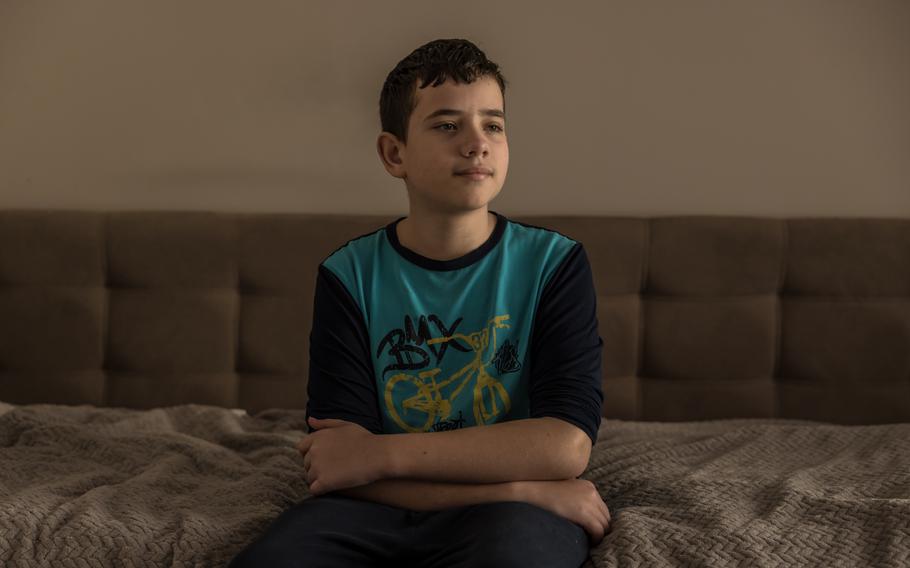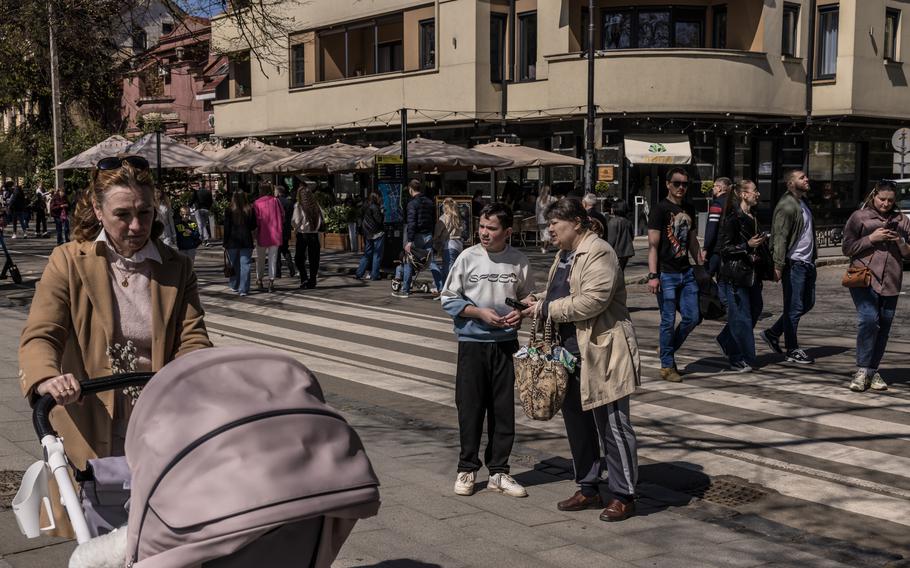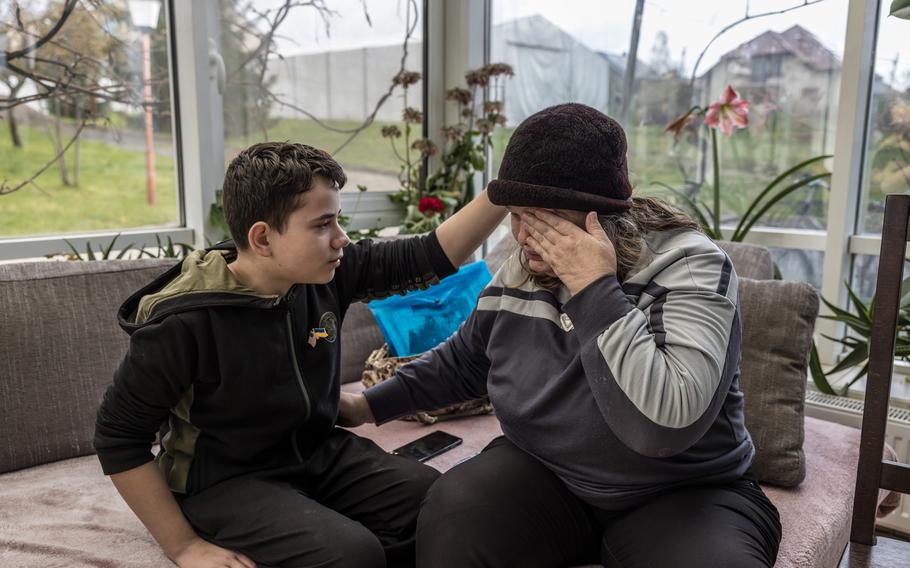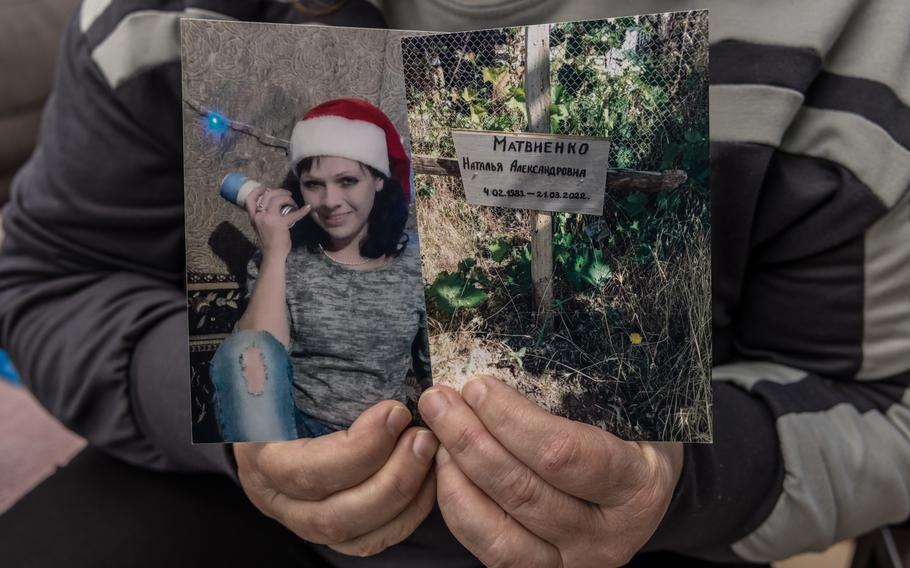Europe
Thousands of Ukraine’s children vanished into Russia. This one made it back.
The Washington Post June 2, 2025

Illia Matviienko is pictured here on April 13, 2025. He was taken to a hospital in the Donetsk region where he was going to be adopted by a Russian social worker until his grandmother stepped in. (Oksana Parafeniuk/For The Washington Post)
UZHHOROD, Ukraine — The boy from Mariupol still wasn’t ready to walk to the bus stop alone, so just before 8 a.m., he and his grandmother set off for school together. He reached for her hand, zipping her fingers in his own, and stole a sip of her coffee.
Illia Matviienko was almost 13 but still got lost easily. Three years had passed since his mother bled out in his arms after a Russian shelling, since a neighbor chipped her grave in the frozen winter of their yard, since soldiers found him alone and took him deeper into the occupied Donetsk territory, where he was put up for adoption. There, he almost became a different boy: a Russian one.
Until his grandmother, Olena Matviienko, spotted him in a 26-second Russian propaganda video. Illia became an extraordinary test case for how, and whether, Ukraine could claw back its missing children — a journey that took Olena across four international borders and deep into Russia.
“I wouldn’t have found him if I didn’t see the video,” Olena, 64, said during three days of interviews last month at their home in Uzhhorod, in far western Ukraine. “He would be with a different family now. How much would he remember of who he was?”
Illia’s return in 2022 after weeks in a hospital in occupied Ukraine showed the difficulty of just getting back one child — let alone the tens of thousands of Ukrainian children now at the center of Kyiv’s demands for peace. Deported or disappeared into Russia, their plight has united American politicians to pressure President Donald Trump for their safe return and spurred war crimes charges against Russian President Vladimir Putin and his deputy, children’s rights commissioner Maria Lvova-Belova, for their illegal transfer — charges a Kremlin spokesman disputed as “outrageous and unacceptable.”
During a meeting at the Vatican in May, Ukrainian President Volodymyr Zelensky appealed directly to Pope Leo XIV, asking for the church’s assistance in bringing the children home. Ukraine wants a full accounting of all the children taken to Russia and their repatriation as part of any peace settlement.
Exactly how many children are missing is unknown.
The Conflict Observatory — part of Yale University’s Humanitarian Research Lab, which has consistently provided the most accurate data but will shutter on July 1 because of Trump’s federal funding cuts — has verified that at least 19,500 children were forcibly deported from occupied areas of Ukraine, funneled into reeducation camps or adopted by Russian families, their identities erased.
The real number is probably much higher, senior Ukrainian officials say, but cannot be proved because of poor recordkeeping. “Maybe 50,000. Maybe 100,000. Maybe higher. Only Russia can provide us with this information,” said Mykola Kuleba, former children’s ombudsman for Ukraine and head of the nonprofit Save Ukraine.
In three years of full-scale war, only a small fraction of them have been returned — about 1,300 children — in deals brokered by Qatar, the United Arab Emirates and the Holy See, as well as in covert rescue missions run by volunteers.
Progress is slow and excruciating because Russia “changes their names, their place of birth, their date of birth,” said Daria Zarivna, an adviser to Zelensky’s chief of staff who works on the Ukrainian initiative Bring Kids Back UA. “All ties are cut.”

Illia and his grandmother, Olena Matviienko, 66, take a walk in the city center, April 13, 2025. (Oksana Parafeniuk/For The Washington Post)
‘I was Ukrainian’
When Olena first brought Illia home to Uzhhorod in the spring of 2022, he slept with the lights on and the bedroom door wide open. Sirens and loud noises terrified him. He had four friends at school but feared no one understood what he’d been through.
As one of the first children to return from Russia since the beginning of the full-scale invasion, Illia’s case soon went public. Olena began receiving calls for him to testify in front of roomfuls of politicians. He agreed to speak to anyone who would listen.
Germany’s parliament came first. Illia was instructed to ignore the crowd, to only look at the person speaking to him. By the time he appeared at the United Nations last year, he was no longer nervous. He waited his turn, then carefully answered questions. He was barely visible behind the microphone — his unruly thatch of dark hair and moon-pale skin obscured.
And then he told his story.
The Russian soldiers found him a day after his mother died, he said, starting at the beginning.
It was March 2022, and for weeks, he and his mother, Nataliia, had cowered in a basement in Mariupol, melting snow to drink and cooking over an open fire when their gas ran out. They ventured outside to look for food — and were badly injured by the Russian shelling of a nearby building. Illia’s legs were bloody and shattered, the back of his left thigh a gaping wound. Nataliia sustained a serious head injury. She dragged her son into a nearby apartment building. They fell asleep inside, arms knotted around each other.
The next morning, Illia awoke to stillness.
A neighbor took Nataliia’s body away. Then, men in Russian uniforms arrived and drove Illia to a hospital in the city of Donetsk, 75 miles from the siege. Orphans from Mariupol filled the third floor. Illia listened to doctors debate whether to amputate his left leg before opting against it. He had surgery without anesthesia, he said, and was later interviewed on camera about his mother’s death by a stranger.
Instead of looking for his family or contacting his home country, as required by international law, officials issued him a Russian birth certificate and put him up for adoption. A social worker visited his hospital room, gifting him an orange plush Garfield cat and teaching him a Russian poem about a bear. She said she planned to adopt him.
“I didn’t want to go,” Illia said later. “It was Russia, and I was Ukrainian.”
He befriended the boy next door, Vitalii, whose parents were also missing. Nurses told the boys that they — along with 30 other children — would soon be sent to Moscow. Illia wondered where his grandmother was.
Olena’s journey
More than 800 miles away in Uzhhorod, Olena was reeling. A family friend had sent her a Russian propaganda video posted online of Illia in his hospital bed, speaking into a blue-and-red microphone.
Olena grew up in the eastern industrial territory that Russia now controlled, working as a machine operator in a factory, then selling bread and cookies for a local bakery. When Illia’s father abandoned Nataliia at six months pregnant, Olena vowed to help her daughter take care of the baby.
She wasn’t breaking that promise now.
The only document she had to prove Illia was her grandson was a copy of Nataliia’s passport. Volunteers at a local shelter helped her get copies of the rest — Illia’s reissued Ukrainian birth certificate, her housing registration, custody paperwork, the police investigation into her daughter’s death. She tucked the documents in a clear plastic bag and contacted the Presidential Office, which launched a first-of-its-kind special operation to get Illia back and, through volunteers in Russia, helped Olena get in touch with the hospital in Donetsk.
On the phone, the head doctor told her Illia’s adoption was pending.
“Don’t you dare,” she remembers telling him.
Within weeks, Olena and another man — whose young granddaughter, Kira, was also being held in Russia — boarded a special diplomatic train to Poland. Once there, Olena said they flew to Moscow on a private plane provided by a Russian oligarch, then took a 20-hour train to Donetsk. In the early years of the war, such an audacious journey was still possible, but now it’s often not, officials say.
After finally reaching the hospital, Olena wrapped a distraught Illia in her arms.
“He didn’t believe it was me,” Olena said. “He lost his hope. He didn’t actually believe I would come and bring him back to Ukraine. Not until the very last minute … did he believe it.”

Illia Matviienko comforts his grandmother, Olena Matviienko, as she cries, on April 12, 2025. “He didn’t believe it was me,” Olena said. “He lost his hope. He didn’t actually believe I would come and bring him back to Ukraine.” (Oksana Parafeniuk/For The Washington Post)
The lucky one
In the park out front of his school, Illia kissed Olena goodbye.
He cut across the damp grass and veered inside, past a map of Ukraine - Crimea still tethered to the rest of the country, Mariupol tucked safely within its borders, Russia separated by a thick line of black.
In Room #40, he sat near a window with a friend until class began. After a short quiz, his teacher Tetiana Dolgova observed the nationwide moment of silence for all the war had taken.
“Thank God this city is remote from the front lines,” she told the students. “We need to remember every day who gave their lives for our happiness and freedom. It’s not only about our servicemen at the front lines. Your classmate Illia witnessed the awfulness of this war with his own eyes.”
When the students turned to look at him, he didn’t duck his head. He was more confident now, the years dulling some of his memories.
He could still recall Mariupol — how he and his mother would ride the city bus to the beach and wade in the cool waves of the Sea of Azov, and in the winter their snowball fights — but he thought about it less frequently.
Photos from a family friend showed his former home in rubble, his two boxes of Lego gone, his five outdoor cats and two dogs vanished. Another photo showed his mother’s grave, a wooden cross planted near the fence in the yard, overgrown with parched yellow grass — a place he could never visit.

Olena shows a photo of her daughter Nataliia and a photo of her makeshift grave in Uzhhorod, April 12, 2025. (Oksana Parafeniuk/For The Washington Post)
In Uzhhorod, Illia keeps his belongings on his grandmother’s ironing board. The orange Garfield cat from the Russian social worker. A blue snake gifted by Olena after he testified to The Hague. A whale from Portugal, where he attended a 17-day rehabilitation program. A bunny from Okhmatdyt Children’s Hospital in Kyiv, where he is still in treatment for his legs, the shrapnel shifting painfully during gym.
“I will have them forever,” he said of his plush animals. “They represent periods of my life and memories, from Donetsk to here.”
He celebrates two birthdays now: the day he was born and the day Olena realized he was alive.
Illia knew he was lucky. Russia had upended his life as he knew it — but he still had his identity. He was old enough to remember who he was. Unlike so many other Ukrainian children, he’d been found. Sometimes, he wondered if Vitalii, his friend in the hospital in Donetsk, had been, too. Or maybe he was now living in Moscow.
Serhiy Morgunov and Serhii Korolchuk contributed to this report.